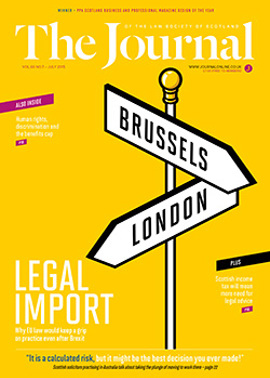Refugees: why article 31 matters
It must be unusual in criminal practice to come across a defence that the Crown is keen to promote whereas, it is believed, many defence lawyers are unaware of it. But a statutory defence to certain immigration offences was thought significant enough to justify a recent half day seminar in Glasgow, organised jointly by the Scottish Refugee Council and the Faculty of Advocates.
The offences, broadly speaking, relate to deception or use of false documents by persons seeking to enter the UK; the defence is available to those who go on to claim asylum and who satisfy prescribed conditions. Even outwith the conditions, however, there are avenues that defence agents should explore.
More than 200 prosecutions have been taken in Scotland since 2009, all from points of entry such as Glasgow, Edinburgh and Stranraer, but with little interaction with the defence to date. The Court of Appeal in England has been scathing of solicitors who fail to explore the defence: R v Mateta [2014] 1 WLR 1516.
Principal speakers on the day included James Wolffe QC, Dean of Faculty, who disclosed that his father was once a refugee from the Nazis; and the Lord Advocate, Frank Mulholland QC, who emphasised that with its priority of protecting minorities including refugees, the Crown was developing a policy that would encompass both a wide interpretation of the statutory conditions, and situations that might still fail to meet the defence.
What article 31 involves
The defence derives from article 31 of the UN Refugee Convention, which is substantially (but not fully) implemented by s 31 of the Immigration and Asylum Act 1999. In Scotland, the offences to which it applies are fraud, uttering a forged document, the possession offences in ss 4 and 6 of the Identity Documents Act 2010, deception and falsification under ss 24A and 26(1)(d) respectively of the Immigration Act 1971, and related attempts. Under s 31 it is a defence for a refugee charged with any such offence to show:
- they presented themselves to the UK authorities without delay;
- good cause for their illegal entry or presence;
- they claimed asylum as soon as reasonably practicable after arriving in the UK;
- if after leaving the place where they were under threat, they stopped in another country, they could not reasonably have expected protection there.
The defence is not available for any offence committed after asylum was claimed.
As the Lord Advocate stated, we should not assume that entry by illegal methods means that a person has no right to be here. Regarding the individual conditions, it was important to focus on their purpose – excluding those who could have claimed asylum in a previous country of transit, and those who have been here a long time and only claim when they are discovered. But a broad application of the conditions involves looking at realities in any intermediate country (others cited a “dysfunctional” asylum system in Greece as an example of lack of protection), and the reasons for any delay in coming forward. These might include the possible effects of trauma, fleeing persecution, or fear of authority, or that the accused was attempting to reach family or friends, and whether they had access to legal advice. “If they are questioned in custody, the availability of legal advice may be very important,” he said.
He recommended that the defence contact the prosecution early on if it is thought s 31 may apply: “No tactical advantage will be lost by doing so.” Even if the tests do not appear to be satisfied, the Crown will consider the public interest in raising proceedings. Has torture been involved, or human trafficking? Was the accused otherwise acting under someone's instructions? The Lord Advocate made clear that he did not want a policy “that reflects some of the language in the immigration debate”.
Turning to the Scottish Government's Human Trafficking Bill, to which the Law Society of Scotland has been pressing for a statutory defence to be added rather than relying on Crown Office policy, the Lord Advocate said that would put an onus on defence advisers, whereas he wanted to focus more widely “on any information that may just be intelligence rather than evidence”.
An actual case study was provided by Stranraer solicitor Amanda Richardson, who urged solicitors to involve an immigration specialist from the outset if they were not so qualified. In her case, as the Lord Advocate confirmed, the provision of full and frank information to the Crown had enabled the advocate depute to conclude that although the case was unlikely to meet all the s 31 criteria, it was likely the accused would be able to claim refugee status and their prosecution would be “an affront to justice”.
There was also flagged the possibility of involving the Scottish Criminal Cases Review Commission where a conviction has followed a failure to advise on the s 31 defence.
Peter Nicholson, editor, the Journal
In this issue
- Caught by the cartels
- Refugees: why article 31 matters
- Virtual victims?
- How much should trainee solicitors be paid?
- Reading for pleasure
- Opinion: Malcolm Combe
- Book reviews
- Profile
- President's column
- Plans reports: yes or no?
- Farewell Brussels?
- Mind games
- Justifying discrimination
- Advance to Australia fair
- People on the move
- Reason for the rules
- Beware the (new) transfer traps
- Pension schemes: the VAT rules change
- Tenancies and the Land Reform Bill
- Scottish Solicitors Discipline Tribunal
- Are you ready for counterpart signing?
- Chapter and verse
- Street Law: a wildfire success
- Law reform roundup
- ADR directive affects complaints
- From the Brussels office
- Transforming perceptions
- Litigators in a fix?
- Unlucky Fridays?
- Flag up, or keep mum?
- Send in the auditors






